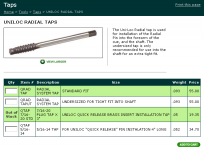You started with the "Engineer" nonsense and any insinuation relating.
You also felt the the need to step in for no reason what so ever, to offer an opinion in something that was not asked. Cleary bored or experiencing some bunching panties perhaps...can't say.
Beyond that....If you prefer to believe that a 'Loose' fitting radial joint in a pool cue is correct , desireable or in some way the ideal condition that one would expect to achieve when creating that union.....
Then I'll just let that stand alone in regards to any question of 'good' as it relates your engineering.
:grin-square:
You also felt the the need to step in for no reason what so ever, to offer an opinion in something that was not asked. Cleary bored or experiencing some bunching panties perhaps...can't say.
Beyond that....If you prefer to believe that a 'Loose' fitting radial joint in a pool cue is correct , desireable or in some way the ideal condition that one would expect to achieve when creating that union.....
Then I'll just let that stand alone in regards to any question of 'good' as it relates your engineering.
:grin-square:
Last edited:
